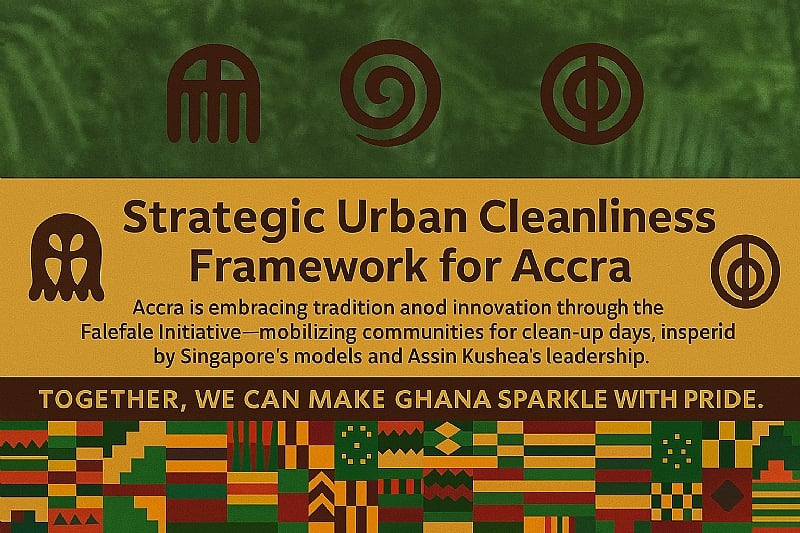Rooted in Legacy. Driven by Innovation. Ready for Nationwide Impact.
🧼 Ghana stands at a pivotal moment where tradition and technology can merge to transform our cities—and Accra, as our capital, must lead the charge. This framework offers a blueprint for a cleaner, healthier, and more culturally resonant urban future, starting with the power of the Falefale Initiative—a community-driven movement grounded in Ga heritage and inspired by global best practices.
1. Falefale Initiative – Community-Led Clean Days
A civic rhythm inspired by tradition, driven by unity.
Monthly city-wide cleanups anchored in Falefale, the Ga word for cleanliness, revived through neighborhood mobilization
Inspired by the Akan Nnoboa tradition of communal labor and international models like Singapore’s Clean & Green campaigns
Civic rituals—drumming, storytelling, and symbolic chants—signal the day and build pride
Adinkra symbols such as Duafe (cleanliness) and Eban (safety) featured across banners, uniforms, and signage
2. Mechanized Heritage Street Sweepers
Reviving Ghanaian ingenuity with modern flair.
Reintroduction of compact sweepers, echoing Accra’s 1960s sanitation trucks and adapted for modern urban corridors
Equipped with solar panels and filters for night operations across key zones like Korle-Bu, Osu, and La
Kente-inspired visual branding paired with civic proverbs to reignite pride and responsibility
3. Tricycle-Based Waste Relay Network (TWRN)
Micro-mobility meets macro impact.
Deployment of locally assembled tricycles to transport garbage from homes to collection hubs for onward recycling
Youth cooperatives manage and maintain fleets, fusing employment with civic duty
Borrowed from successful waste models in Vietnam and India, using agile mobility for neighborhood-scale efficiency
4. Civic Culture Zones and Clean Streetscapes
Making cleanliness visible, symbolic, and beautiful.
Pavement mosaics around schools, markets, and CHPS compounds integrate Adinkra, Ga designs, and sanitation proverbs
Public signage reminds citizens of their role as protectors of the land
Community artists and photographers (like young Elikem!) document transformation as civic art
5. Clean Cities Council (C³)
Integrated stewardship from community to capital.
Regional councils formed in Accra, Kumasi, Takoradi, Tamale, and Ho to coordinate strategy, data, and outreach
Annual Falefale Forum showcases innovations and testimonies from civic champions
Aligns with telemedicine and health initiatives for a holistic view of cleanliness and wellbeing
6. Deepening Community Engagement
From participation to ownership.
Recognition programs for Clean Champions—families, schools, and vendors who embody sanitation values
Mobile reporting tools allow citizens to flag problem areas and follow up on cleanup progress
Faith institutions incorporate cleanliness themes into sermons and festivals
Civic education modules taught in schools, linking Falefale to patriotism and health
7. Rural Expansion Strategy – Falefale Beyond Accra
Cleanliness as a national covenant.
Pilot Falefale Days in rural districts using CHPS compounds and local leaders as hubs
Adoption of affordable sanitation tech like Digni-Loo and SATO pan by rural households
Radio dramas and storytelling in native dialects promote norms of hygiene and civic duty
Regional sanitation funds support infrastructure, youth employment, and local innovation
A Model of Visionary Leadership – The Assin Kushea Example
In Ghana’s Central Region, Assin Kushea shines as a national model—declared the cleanest town in Ghana. This transformation was spearheaded by Ehunoabobrim Nana Prah Agyensaim VI, a chief whose leadership blends deep cultural wisdom with practical civic innovation. His town boasts weekly communal cleanups, civic education in schools, and vibrantly painted public bins that deter theft and promote pride. Kushea’s cleanliness has even led to drastically reduced malaria rates—proving that sanitation saves lives. Nana Prah Agyensaim VI, honored as a Sanitation Ambassador, embodies the future of traditional leadership in Ghana. His model should not just be celebrated—it should be emulated. Chiefs across the country can look to Kushea as a template for holistic, ethical stewardship.
🧼Ghana deserves cities—and villages—where cleanliness is not enforced, but **cherished**; not a burden, but a **shared legacy**. The is ready to lead that charge, echoing through every street, tricycle, mural, and memory. 🇬🇭🌍🇬🇭✨📢
Retired Senior Citizen
Teshie-Nungua
[email protected]


